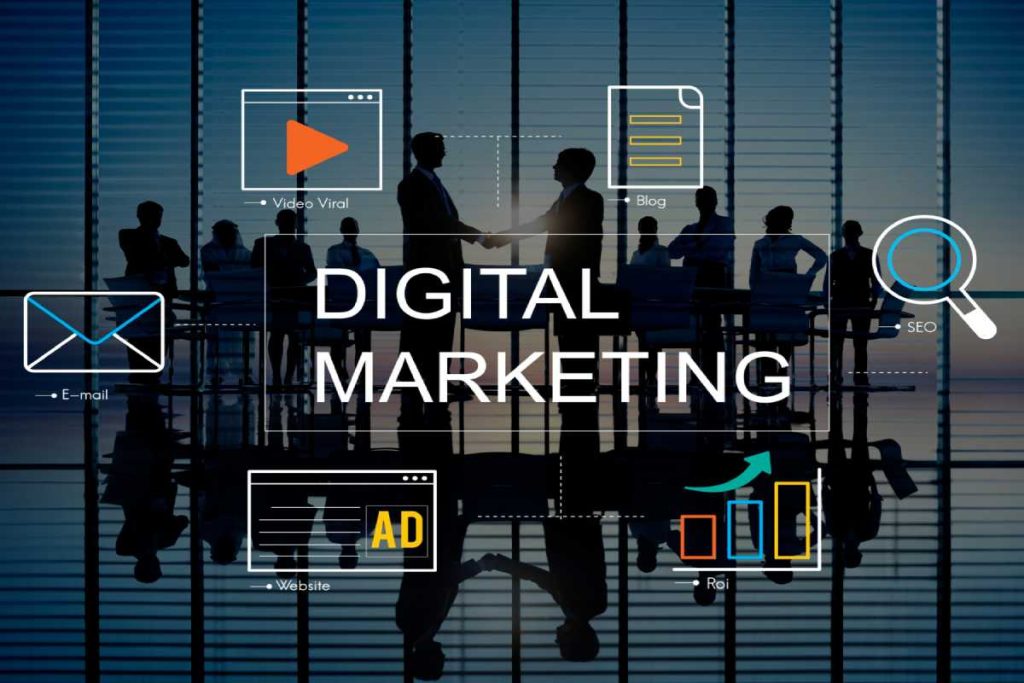In today’s hyper-connected world, Digital Marketing has become an essential component of any successful business strategy. It refers to all marketing efforts that use digital channels like websites, search engines, social media, email, and mobile apps to reach and engage with current or potential customers. Unlike traditional marketing, Digital Marketing allows for more precise targeting, real-time interaction, and data-driven decisions that are measurable and scalable.
The Definition and Purpose of Digital Marketing
Digital Marketing is the process of promoting products, services, or brands using the internet and electronic devices. Its main objective is to connect with consumers where they already spend most of their time: online. This includes reaching potential customers through search engines, social media, mobile apps, email, and other online channels.
The purpose of digital marketing isn’t just to gain visibility — it’s about building relationships, delivering value, and encouraging action. Businesses that implement digital marketing strategies effectively can increase brand recognition, generate leads, convert prospects, and retain customers through personalized engagement and strategic communication.
Key Channels Used in Digital Marketing
Digital Marketing is a broad field with various channels, each playing a unique role in customer acquisition and retention. Some of the most important include:
- Search Engine Optimization (SEO) – Enhances organic visibility on search engines like Google and Bing.
- Content Marketing – Involves creating and distributing valuable, relevant content to attract and educate users.
- Social Media Marketing – Focuses on growing brand awareness and engagement on platforms like Instagram, Facebook, and LinkedIn.
- Pay-Per-Click (PPC) – Delivers instant visibility through paid advertising on search engines and social media platforms.
- Email Marketing – Enables direct, personalized communication with leads and customers.
- Affiliate Marketing – Involves partnerships with individuals or companies to promote your products for a commission.
Combining these channels within a cohesive strategy leads to improved cross-platform integration and consistent messaging across all customer touchpoints.
Why Digital Marketing Matters Today
The digital landscape has reshaped how businesses and consumers interact. Traditional marketing methods alone are no longer sufficient. Digital Marketing enables businesses to meet customers where they are — on their phones, in their inboxes, and in their social feeds.
It allows for real-time feedback, detailed analytics, and the flexibility to pivot strategies as needed. Unlike print ads or billboards, digital marketing efforts can be tracked and optimized continuously. Whether you’re a startup or a multinational company, digital marketing provides the tools to grow sustainably, attract global audiences, and maintain a competitive edge with scalable solutions.
The Role of SEO in Digital Marketing
Search Engine Optimization, or SEO, is a core pillar of digital marketing. It refers to the practice of optimizing your website and content to rank higher in search engine results for specific keywords. When done correctly, SEO helps bring in highly relevant traffic that is more likely to convert.
SEO involves several components: keyword research, content optimization, backlink building, site structure improvements, and technical audits. A fast-loading, mobile-friendly website with quality content has a higher chance of earning top positions in SERPs. Over time, SEO becomes a cost-efficient way to generate traffic and improve brand credibility through organic discoverability.
Understanding Your Audience in Digital Marketing
No marketing strategy can succeed without knowing who you’re talking to. Digital Marketing makes it easier than ever to collect, analyze, and apply data about your target audience. Using tools like Google Analytics, Facebook Business Suite, and CRM platforms, marketers can access demographics, behavior patterns, and customer journey data in real time.
With this information, you can segment audiences and personalize messages based on their needs, preferences, and actions. The result is more relevant content, improved engagement, and higher conversions. Understanding your audience also enhances retention and customer loyalty through value-driven communication.
Benefits of Digital Marketing for Businesses
There are numerous reasons why Digital Marketing has become indispensable in today’s business world:
- Global Reach – Connect with potential customers from all over the world, instantly.
- Cost-Effectiveness – Get better ROI than traditional marketing methods with budget-friendly campaigns.
- Measurable Outcomes – Use detailed analytics to track performance and optimize campaigns in real time.
- Customer Personalization – Deliver tailored content and offers that speak directly to individual user needs.
- Real-Time Engagement – Interact with customers as they browse, shop, or research your brand online.
These benefits make digital marketing one of the most adaptable and results-driven methods for modern business growth.
Common Tools and Platforms in Digital Marketing
To execute effective Digital Marketing campaigns, professionals rely on a variety of tools and platforms. Here are some of the most widely used:
- Google Ads – For targeted PPC campaigns that drive quick traffic.
- Meta Business Suite – Manage Facebook and Instagram ad campaigns and page insights.
- SEMrush & Ahrefs – For keyword tracking, backlink audits, and competitive analysis.
- Mailchimp & ActiveCampaign – Manage email campaigns and customer segmentation.
- HubSpot & Zoho CRM – Streamline your sales and marketing efforts with automation and reporting.
These tools enable marketers to execute campaigns efficiently, analyze data, and make informed decisions for better campaign performance.
Conclusion
Digital Marketing is more than a strategy — it’s a necessity in the modern business world. With the ability to reach vast audiences, measure impact, and engage with customers on a personal level, it offers unparalleled opportunities for growth and brand development. From SEO and content creation to paid ads and email campaigns, digital marketing empowers businesses to thrive in a competitive environment.
As digital trends continue to evolve, staying updated and agile is essential. By learning the fundamentals, choosing the right channels, and consistently measuring performance, any business can unlock the full potential of Digital Marketing and drive lasting success in the digital age.
Frequently Asked Questions
What is digital marketing?
It’s the practice of promoting products or services using online channels like search engines, websites, social media, and email.
Is digital marketing suitable for small businesses?
Yes. It allows small businesses to compete with larger ones using cost-effective tools and targeted strategies.
What is the difference between SEO and PPC?
SEO is about earning traffic organically through search engines, while PPC involves paying for clicks through ads.
Which digital marketing channel is most effective?
It depends on your goals and audience, but SEO, email marketing, and social media are among the most effective.
How long does it take to see results?
SEO may take months, while PPC and email campaigns can show results within days or weeks.
Is content marketing part of digital marketing?
Yes. Creating valuable content helps attract, educate, and convert potential customers online.
Do I need a website to start digital marketing?
While not mandatory, having a website improves credibility and centralizes your online presence.
What skills are needed in digital marketing?
Skills like SEO, data analysis, content creation, social media management, and paid advertising are essential.
Can I learn digital marketing on my own?
Absolutely. Many free and paid resources, courses, and certifications are available online.
How do I track digital marketing performance?
Use tools like Google Analytics, Search Console, and CRM platforms to monitor traffic, conversions, and campaign success.







